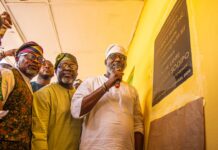… To empower Kwara graduates at INSU event
A chieftain of the All Progressives Congress, Engineer Sunday Adebayo Babalola, on Tuesday said godfatherism retarded development in Kwara State.
He stated that those elected officials owed allegiance to their godfathers to the detriment of the welfare of Kwara State indigenes and residents and the general human capital and infrastructural development of the state.
In an interview, he, therefore, urged Kwara State people to elect competent, credible, and humane leaders, who he said are dearly needed in the State.
According to him, it has become imperative to have better civilian political leaders in the state, as he opined that civilian leaders, except during the short term of Chief Cornelius Adebayo, had been poor.
Babalola, a governorship aspirant in Kwara State during the 2011 and 2015 electioneering process stated that there would have been radical positive human resources and infrastructural transformation in Kwara State if the state had enjoyed the right kind of leaders, who were competent, credible, and humane.
He opined that such leaders will transform Nigeria and Kwara State, in particular.
According to him, poor leadership had been identified as the bane of societal development.
He advised Kwarans, in particular, and Nigerians, in general, to elect credible, competent, and humane leaders, who have the interest of the masses at heart and who will deliver the dividends of democracy to the people.
He urged them not to elect leaders based on religious, tribal, or other primordial considerations, adding that competent leaders will ensure human resources, economic and infrastructural transformation as well as improvement in the quality of life and welfare of the people.
According to him, civilian governance in Kwara State, except during the short tenure of Chief Cornelius Adebayo, had been poor.
He noted that bad governance had retarded growth and development in the state and the nation.
He stated that it had therefore become needful for Kwarans to elect competent people from councilors, local government chairmen, state legislators, National Assembly members, Governor, and even the President.
Babalola said he will empower many graduates from the state on December 01, 2021; during an event facilitated by the Igbomina National Students’ Union.
He stated that the empowerment programme titled, ‘Raising INSU potential through empowerment,’ will take place at Igbomina House, Ganmo, Kwara State. He added that the topic of the event is: ‘Build the youth; build the nation.’
The philanthropists remarked that he had spent about N1,450,000.00 to empower 35 persons. He explained that 14 ICT gadgets, 12 professional sewing machines, four ovens, two make-up kits, one hairdryer, and one professional welding machine were given out to the beneficiaries during the last empowerment organised by INSU.
He called on other philanthropists to invest in and empower youths, noting that youths are energetic, innovative, resources and can ontribute positively to societal development and even become employers of labour when empowered.
He noted that he had given scholarships to 1,362 students and pupils in primary, secondary and tertiary institutions, empowered widows, aged people, sponsored health outreaches which the beneficiaries included some members of Gaa Akanbi, Biada and Oniganka communities in Ilorin South Local Government of Kwara Central; Aare Opin, Osi Community and Oke Opin from Ekiti LGA; Odo-Owa in Oke-Ero LGA of Kwara South and Patigi,Tankpafu and Garogi of Patigi LGA in Kwara North.
Babalola said, “My call will not be to the government. My call will be to the people. My call will not be to the government. The reason is that most people in government today got to the government before they started thinking about what they will do with the opportunity.
“The people should elect servant leaders who care for them and who will work for them. Calling on the government is not necessary because calling on them, they do not know what to do. Your voice will go bad in your call. But if somebody knows what to do, he does not need to be called upon. So they should elect the right people in place. They should forget religion, they should forget tribe, they should forget primordial instincts and elect the right people, instead of electing people because of emotion. Who can do it? Interview them. It is just like you are their employer. People are calling on you and if somebody pays you to elect him, he has already paid you for the next four
years. You have no right to question his governance.
“Kwarans should look at everybody in the field, everybody that is coming to contest, whether it is House of Assembly, local government chairman, councilors in LG, House of Representatives, Senate and Governorship. They should look at the field and ask the aspirants what will they do when they get there. Let there be a written agreement between them and the people. That is why, when we were contesting, we had a covenant with the good people of Kwara State. The people will look at such agreement or manifesto of the aspirant and refer to it and later ask the person they elected: Look, you said you will do this, we have not seen you do it; what have you done?
But when you elect not based on what the person has to offer, on which you can evaluate him, during the course of his tenure, then, you are just electing someone who will just sit down there and only get siren blown in front of you when he is going out. But when you elect based on what you can do, you have got the aspirant to say this is what I can do. Three months after the election, six months in office, one year in office, you can start questioning him because you already have his key performance indicator. And you can challenge him or her. You said you will do this, we have not seen that yet.
“Governance in Kwara has always been very poor. And I mean it. I think the last time we had good governance was during the period of Chief C.O. Adebayo and they only spent three months. Because of Godfatherism. Some of them will want to perform but they could not perform because of Godfatherism. Because the God-father who appointed them kept dictating to them. It was an appointment we had in Kwara and not an election. I am talking of civilians now. The military is a different case. They were appointed and basically did their best during their time. But civilians were appointed by individuals who said ‘I keep you and once I keep you, you do my desire.’ So they are loyal to him and not to the electorate. And because they are loyal to him, whatever he wants is what they want and it is what they had to do. So, at least, civilian governance in Kwara has always been very poor.
“And that is why I now ask kwarans that in the coming dispensation, they should elect people who will provide good governance, deliver dividends of democracy to them. They should consider and look for who can deliver. Nobody is perfect but among all these people who do I think is my best option and you elect him based on that not based on that he gave you money. Because whatever money he gave you is your own, then the people who could not get the chance to collect money will also be affected by the poor governance.”
He stated that though some past and present civilian governors may claim to have made significant achievements, such claims were unsatisfactory considering the revenues at the disposal of such governors as well as the harmonious nature of the people.
Kwara State had been governed by David Bamigboye (Military governor) from 28 May 1967 to July 1975; Ibrahim Taiwo, (Military Governor) July 1975 to 13 February 1976; George Agbazika Innih (Military Governor), March 1976 to July 1978; Sunday Ifere (Military Governor), July 1978 to October 1979; Adamu Atta (Civilian Governor), October 1979 to October 1983 under the National Party of Nigeria; Cornelius Olatunji Adebayo (Civilian Governor), October 1983 to December 1983 under the Unity Party of Nigeria; Salaudeen Latinwo (Military Governor), January 1984 to August 1985; Mohammed Ndatsu Umaru (Military Governor), August 1985 to December 1987; Ahmed Abdullahi (Military Governor), December 1987 to July 1988; Ibrahim Alkali (Military Governor), July 1988 to December 1989; Aand Alwali Kazir (Military Governor) December 1992.
Other were Shaaba Lafiaji (Civilian Governor under the Social Democratic Party) , January 1992 to November 1993; Mustapha Ismail (Military Administrator) 9 December 1993 to 14 September 1994; Baba Adamu Iyam (Military Administrator) 14 September 1994 to 22 August 1996; Peter A.M. Ogar (Military Administrator) 22 August 1996 to August 1998; Rasheed Shekoni (Military Administrator) August 1998 to 29 May 1999; Mohammed Lawal (Civilian Governor under the All Nigeria Peoples Party) 29 May 1999 to 29 May 2003; Olubukola Saraki (Civilian Governor under the Peoples Democratic Party), 29 May 2003 to 29 May 2011; Abdulfatah Ahmed, (Civilian Governor under the Peoples Democratic Party) 29 May 2011 to 29 May, 2019 and currently Abdulrahman Abdulrazaq (Civilian Governor under the All Progressives Congress), 29 May 2019 till date.
The state was created on May 27, 1967, when the Federal Military Government under General Yakubu Gowon broke the four regions that then constituted the Federal Republic of Nigeria into 12 states.
At its creation, the state comprised the former Ilorin and Kabba provinces of the then Northern Region. It was initially named the West Central State but later changed to ‘Kwara’ a local name for the River Niger.
Since its creation in 1976, has reduced in size as a result of further state creations in the country. The Idah/Dekina part of the state was carved out and merged with a part of the then Benue/Plateau State to form Benue State.
Also on 27 August 1991, five local government areas, namely Kogi, Oyi, Okehi, Yagba, and Okene were also carved out from it to form part of the new Kogi State. The sixth LGA, Borgu, was merged with Niger State.
The state which currently has 16 LGAs, has a land area of 36,825km2 (14,218 sq) and its 9th in size of the 36 states of the federation.






